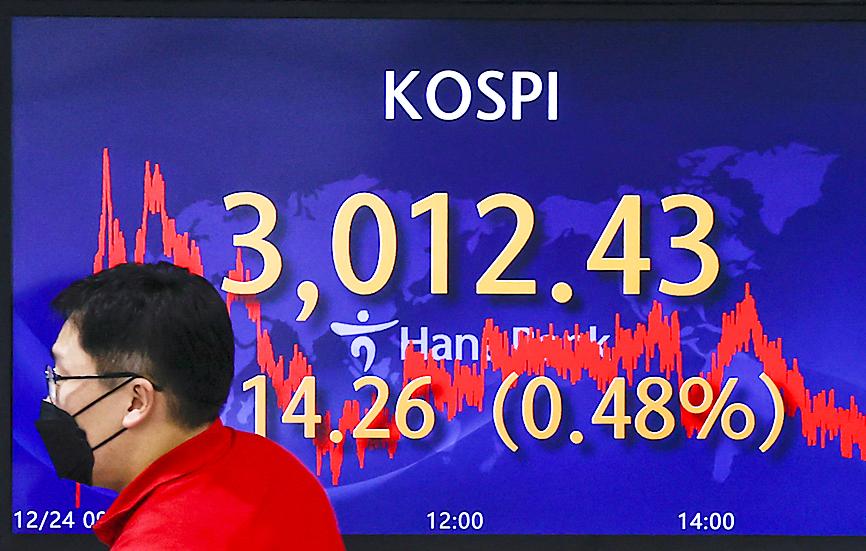Asian stock markets rose on Friday after Wall Street hit a new high as fears of the Omicron variant of SARS-CoV-2 eased.
Taipei, Hong Kong and Sydney all advanced, while Tokyo and Shanghai declined.
Wall Street’s benchmark S&P 500 index on Thursday rose 0.6 percent in the last US trading session before Christmas.

Photo: EPA-EFE
Investor anxiety has mounted as Omicron spread, but moderated after authorities said it might cause less severe illness.
US President Joe Biden called for more vaccinations and testing, but announced no plans for travel restrictions.
Omicron looks like a “short-term disruption” instead of a “destructive headwind that knocks the economy off its course,” Oanda Corp senior market analyst Edward Moya said in a report. “The US economic recovery in 2022 still looks very strong.”
In Taiwan, the TAIEX ended up 14.98 points, or 0.08 percent, at 17,961.64, posting a weekly increase of 0.84 percent.
Japan’s Nikkei 225 lost 0.05 percent to 28,782.59, but rose 0.83 percent from a week earlier, while the broader TOPIX dropped 0.13 percent to 1,986.78, up 0.12 percent on the week.
Hong Kong’s Hang Seng advanced 0.13 percent to 23,223.76, gaining 0.13 percent from a week earlier, while the Shanghai Composite Index lost 0.69 percent to 3,618.05, posting a weekly decline of 0.39 percent.
Seoul’s KOSPI added 0.48 percent to 3,012.43, but dropped 0.18 percent from a week earlier, while Sydney’s S&P/ASX 200 was 0.44 percent higher at 7,420.3, up 1.59 percent on the week.
New Zealand and Jakarta advanced, while Bangkok retreated. Singapore was closed for Christmas.
Additional reporting by staff writer, with CNA

UNCERTAINTY: Innolux activated a stringent supply chain management mechanism, as it did during the COVID-19 pandemic, to ensure optimal inventory levels for customers Flat-panel display makers AUO Corp (友達) and Innolux Corp (群創) yesterday said that about 12 to 20 percent of their display business is at risk of potential US tariffs and that they would relocate production or shipment destinations to mitigate the levies’ effects. US tariffs would have a direct impact of US$200 million on AUO’s revenue, company chairman Paul Peng (彭雙浪) told reporters on the sidelines of the Touch Taiwan trade show in Taipei yesterday. That would make up about 12 percent of the company’s overall revenue. To cope with the tariff uncertainty, AUO plans to allocate its production to manufacturing facilities in

Taiwan will prioritize the development of silicon photonics by taking advantage of its strength in the semiconductor industry to build another shield to protect the local economy, National Development Council (NDC) Minister Paul Liu (劉鏡清) said yesterday. Speaking at a meeting of the legislature’s Economics Committee, Liu said Taiwan already has the artificial intelligence (AI) industry as a shield, after the semiconductor industry, to safeguard the country, and is looking at new unique fields to build more economic shields. While Taiwan will further strengthen its existing shields, over the longer term, the country is determined to focus on such potential segments as

TAKING STOCK: A Taiwanese cookware firm in Vietnam urged customers to assess inventory or place orders early so shipments can reach the US while tariffs are paused Taiwanese businesses in Vietnam are exploring alternatives after the White House imposed a 46 percent import duty on Vietnamese goods, following US President Donald Trump’s announcement of “reciprocal” tariffs on the US’ trading partners. Lo Shih-liang (羅世良), chairman of Brico Industry Co (裕茂工業), a Taiwanese company that manufactures cast iron cookware and stove components in Vietnam, said that more than 40 percent of his business was tied to the US market, describing the constant US policy shifts as an emotional roller coaster. “I work during the day and stay up all night watching the news. I’ve been following US news until 3am

COLLABORATION: Given Taiwan’s key position in global supply chains, the US firm is discussing strategies with local partners and clients to deal with global uncertainties Advanced Micro Devices Inc (AMD) yesterday said it is meeting with local ecosystem partners, including Taiwan Semiconductor Manufacturing Co (TSMC, 台積電), to discuss strategies, including long-term manufacturing, to navigate uncertainties such as US tariffs, as Taiwan occupies an important position in global supply chains. AMD chief executive officer Lisa Su (蘇姿丰) told reporters that Taiwan is an important part of the chip designer’s ecosystem and she is discussing with partners and customers in Taiwan to forge strong collaborations on different areas during this critical period. AMD has just become the first artificial-intelligence (AI) server chip customer of TSMC to utilize its advanced